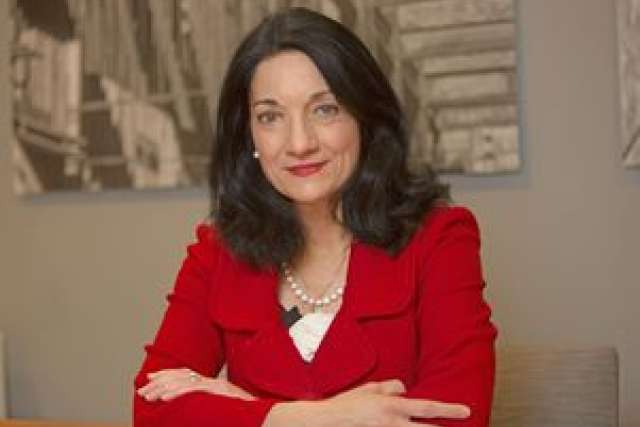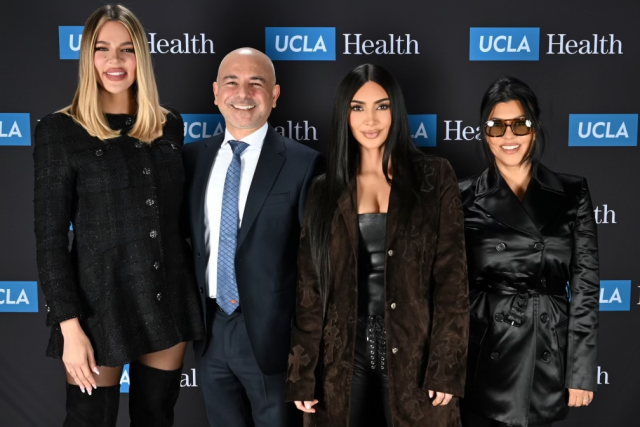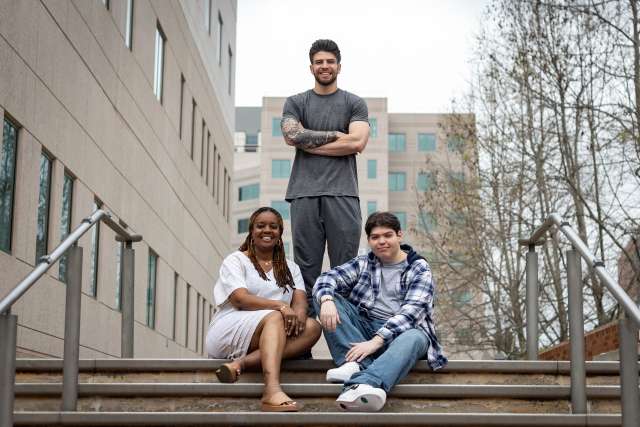After more than two decades working to build University of Washington Medicine into the premier health system in the Pacific Northwest, it was a tough choice for Johnese Spisso to uproot and move 1,000 miles south to take the reins as president of UCLA Health and CEO of UCLA Hospital System. “I am definitely not someone who job hops,” she says. “I get so connected to the mission of the organization, it becomes a passion. Truly, the only place I would have left for was UCLA.”
Spisso arrived from Seattle, Washington, last February to oversee the operations of UCLA’s hospitals and clinics. She brings with her a national reputation and more than 30 years of leadership experience in academic health care — 22 years at UW Medicine in progressive leadership positions, with the past eight years serving in the top role as chief health system officer and vice president for medical affairs. Prior to UW Medicine, she worked for 12 years at UC Davis Medical Center, where she directed critical care; trauma, burn and emergency services; and the Life Flight Air-Medical Program. Spisso has a master’s degree in health care administration and public administration from the University of San Francisco.
Before moving into leadership roles, Spisso worked as a registered nurse in critical care. “My background in nursing and patient care has served me well throughout my career in administration and leadership,” she says. “It has given me the perspective to understand the full continuum of care and the needs of the patient, as well as the needs of care providers so they can best serve patients.”
She talked with U Magazine editor David Greenwald about the opportunities ahead for UCLA Health and her vision for the future.
What makes this the right time for you to leave an institution you have spent nearly a quarter-century working to build and come to UCLA?
My excitement about coming to UCLA is not just because of where UCLA Health is now, but because of where it is going in the future. The level of support that UCLA has in the Los Angeles community is remarkable, and that creates real opportunities for us to be leaders — locally, nationally and internationally — in transforming care for our communities. Today, consumers expect value-driven health care. The innovation and leadership that UCLA has shown in using evidence-based medicine to cure diseases and identify new ways to treat injury and illness put us in a leadership role. It also is a time when we are seeing changes in the health care marketplace, changes that are happening faster than they ever have before. We are seeing provider networks narrow and many different types of affiliations and collaborations taking place. With the expansion of health care coverage under the Affordable Care Act, we are seeing many more patients coming to us for the first time for healthcare. It is really a remarkable and exciting time to be in health care.
How does that affect UCLA’s approach to health care delivery?
Our goal is to deliver on the triple aim of better access to care, better population health and more affordable health care. To address this goal, UCLA is taking steps like expanding access into communities, opening clinics closer to where patients live so that we can affect the health outcomes of a group of individuals, what is known as population health, in a more meaningful and affordable way. We now have more than 160 outpatient locations throughout the Southern California region, which enable us to provide prompt access to care and really to begin to influence the health of these communities. In addition, UCLA Health partners with many other community organizations to expand access for underserved patients. For example, we provide physician staffing for the Venice Family Clinic that provides care to more than 10,000 individuals.
What larger opportunities does that present?
They are multifold. Our mission as a leading academic health system is to provide high-quality, value-added health care, complete the bench-to-bedside translation of our research efforts and to train the next generations of health care professionals. UCLA Health is well-positioned to lead the way in advances and the transformation of the health care-delivery system to make health care accessible for all, in convenient locations. Our ability to deliver on our vision of healing humankind, one patient at a time, by improving health, alleviating suffering and delivering acts of kindness is what makes patients and families choose us for care. Going forward, we continue our efforts to make health care more affordable and eliminate inefficiency and waste, while improving the experiences and outcomes for our patients and families.
UCLA’s presence in communities throughout the region is increasing. What is behind this expansion?
This really is part of a nationwide movement. As we progress toward population health and away from what used to be a very siloed model of health care in which people came in only when they were sick, expanding in the community allows us to deliver preventive health care close to people’s homes in an affordable and accessible way. At the same time, as we enter areas where there are opportunities to serve the community better, we continue to work with a variety of community agencies to broaden the scope of services we can provide. At the Venice Family Clinic, for example, we provide medical staff to help care for more than 10,000 residents who are among the most vulnerable populations in Los Angeles. Our work in settings like the Venice Family Clinic also enables us not only to provide care, but also to study innovations to remove barriers in access to care for underserved populations. As we work with organizations in the community to promote wellness to help populations stay healthy, we also are looking at how we can become more involved in such areas as food and nutrition services, so we have a whole portfolio of activities that we provide and partners with whom we work to help make these improvements a reality.
Over the past several years, UCLA has become a national leader in evolving a culture of patient-centered care. Do you see ways to elevate that culture to another level?
Much of our effort has been focused on leadership and staff training, about what we need to do to make the patient experience better. As our culture evolves further, we are looking more at patient empowerment — listening and learning from the voice of the patient. So now, we are creating advisory councils that include patients and members of their families, as well as physicians and leaders. Sometimes, as health care providers, we think we know what is best, but, really, it is the people who are using our services 24/7 who recognize how we can improve. Groups like advisory councils can provide us with the best information about what goes right and also about what goes wrong and where we can make improvements. They can identify the hurdles that patients feel are barriers to efficient care. We learn a great deal from when things don’t go exactly as we would have liked, and we don’t meet a patient’s expectations.
The strategies we are using for patient empowerment are even more important as we move more into population health, and we ask patients and their families to be accountable and to be partners with us for their own health care. As the public becomes more educated about health care and such things as quality and safety, consumers are asking different questions. As we enter into the realm of price transparency, they will be focusing more on cost and value. That is driving us to look closely at our systems and at how we can take out waste and inefficiencies, while providing care in an environment that is error-free. We are moving toward an approach, I think, that will be very similar to what the airline industry did years ago, building an infrastructure that supports quality and safety, one that ensures we are training our staff at every level to report any near-misses, any errors in the system that they feel lead to undesired events for patients. We want to have a culture in which staff members who identify an issue are not blamed or punished for doing so. We know from studying events and errors in health care that the process of errors begins at a very basic level, and it snowballs if no one says, “Stop.” We also want a culture in which patients and their families are empowered to speak up if they observe something that causes them concern.
Read the rest of this conversation in U Magazine’s summer 2016 issue. U Magazine is a publication of UCLA Health and the David Geffen School of Medicine.



